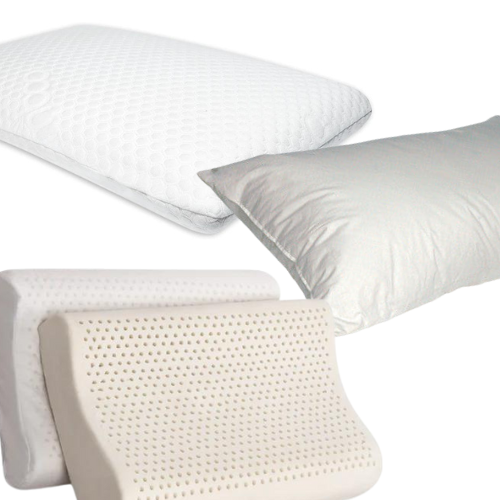Choosing the right pillow is important for getting a good night’s sleep. As chiropractors, we understand that with so many options available, it can be overwhelming to figure out which one is best for you. In this blog, we’ll go over 4 tips for choosing the best pillow for you.
Tip 1: Consider Your Sleeping Position
Your sleeping position is an important factor to consider when selecting a pillow. For example, if you sleep on your stomach, a thin pillow is best to prevent strain on your neck. If you sleep on your back, a medium-thickness pillow can help maintain the proper alignment of your spine. If you sleep on your side, a contoured pillow can help support your neck and keep your spine aligned. Ensuring that you have the correct support for your neck will reduce pressure and the instance of neck pain.

Tip 2: Determine Your Material Preference
Pillows come in a variety of materials, including down, memory foam, latex, and synthetic fibres. Each material has its pros and cons, so it’s important to determine your preferences. For example, down pillows are soft and mouldable, but they can be expensive and trigger allergies. Memory foam pillows provide good support and pressure relief, but they can be heavy and retain heat. Latex pillows are durable and supportive, but they can be expensive. Synthetic fibre pillows are affordable and hypoallergenic, but they may not provide as much support as other materials. If you have preexisting neck pain, we highly recommend selecting a material that contours to the shape of your neck and head whilst providing adequate support for your neck and spine.

Tip 3: Consider Your Allergies
If you have allergies, it’s important to select a pillow that won’t aggravate your symptoms. Hypoallergenic pillows are available in a variety of materials, such as synthetic fibres or down alternatives, and can help reduce allergen exposure. A pillow that does not consider your allergies can lead to sleepless nights and allergy migraines.

Tip 4: Replace Your Pillow Regularly
Even the best pillow will eventually lose its shape and support. Most experts suggest it is important to replace your pillow every 1-2 years to ensure optimal comfort and support. Your favourite pillow might just be causing you neck and back pain, so make sure you discard it when it no longer provides the support you need.
Choosing the right pillow is essential for a good night’s sleep. Consider your sleeping position, material preference, and allergies. Remember to replace your pillow regularly for optimal comfort and support. And if you experience pain or have any concerns about your pillow, don’t hesitate to see one of our chiropractors for treatment and advice.





